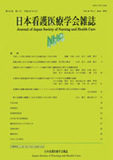Japanese
English
- 有料閲覧
- Abstract 文献概要
- 参考文献 Reference
- サイト内被引用 Cited by
要旨
高齢者に対する傾聴ボランティア活動の継続・普及をはかるためのあり方について示唆を得ることを目的に、Bandura の社会的認知理論の中心概念である自己効力感を基盤とした枠組をもとに、中部地方で傾聴ボランティア活動をしている成人メンバー6名(男性1名)の活動の実際と継続要因を、半構造化面接法にて記述的に明らかにした。対象の活動のきっかけは、新聞記事や知人の勧めなど様々であったが、実際の活動を開始するまでには、自己効力感を生み出す〔代理体験〕〔言語的説得〕〔成功体験〕〔生理的・情動的状態〕の条件が、対象者の行動を強化していた。対象者が活動を通して発見した内容は、【傾聴ボランティアへの有意味感の向上】【コミュニティ意識の向上】【傾聴の理想と現実のギャップ】の3カテゴリーで、活動を継続していくための課題として、【社会的認知の向上】【ボランティア同士の自己研鑽の場の活性化】【高齢者施設のスタッフとの協働】【組織の自主活動を尊重した行政のバックアップ】【傾聴ボランティアを必要とする高齢者の掘り起こし】の5カテゴリーが抽出された。以上より、高齢者に対する傾聴ボランティア活動の継続・普及をはかるための示唆として、①傾聴ボランティア活動に対する自己効力感が高められるような情報提供の必要性、②傾聴ボランティア活動が充実し継続を可能にするための環境整備、③高齢者の掘り起こしと高齢者を傾聴ボランティアに結びつける支援の必要性の三点について考察した。
Abstract
With the aim of obtaining suggestions for how best to continue and spread volunteer listening activities for elderly people, the current status and factors for continuation of the activities of six adults(one male)who participate in volunteer listening activities in the Chubu Region were clarified in a descriptive manner through semi-structured interviews, using a conceptual framework based on self-efficacy in the social cognitive theory of Bandura(1977, 1986). The motivation for the start of the subjects activities varied, including newspaper articles and recommendation from a friend, but until the start of actual activities the subjects behaviors were strengthened by conditions of "surrogate experiences," "linguistic persuasion," "successful experiences," and "physiological and affective state" that produced self-efficacy. Things that the subjects discovered through their activities were in the three categories of "raised sense of meaning as listening volunteers," "raised community awareness," and "gap between the listening ideal and reality," with the five categories of "raised social cognition," "activation of settings for self-development among volunteers," "cooperation with elderly facility staff members," "backup from government services that respect the voluntary activities of organizations," and "identifying elderly people who need a listening volunteer" as issues for the continuation of activities. The above suggests that(1)providing information to increase self-efficacy for volunteer listening activities(2)developing environments to enable the enhancement and continuation of volunteer listening activities, and(3)providing support in identifying elderly people in need and bringing them together with listening volunteers are necessary for the continuation and spread of volunteer listening activities for elderly people.
Copyright © 2014, Japan Society of Nursing and Health Care All rights reserved.


